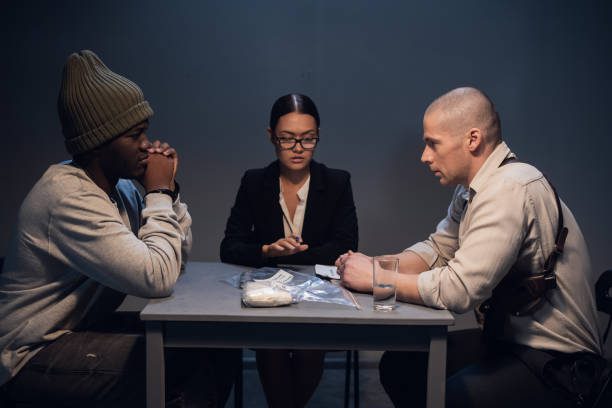
Criminology is the field of analyzing and reforming crime and criminal behavior, informed by sociology, psychology, anthropology, economics, and statistics.
If you watch popular shows such as “Breaking Bad” and want to work with the folks on the good side of the line, consider this: ten criminology careers focused on helping individuals and communities via law enforcement, social justice, and rehabilitation.
1. Private Investigator

Why Become a Private Investigator?
Celebrated in hard-boiled noir literature, the private investigator, also called a private eye, or PI is hired to perform investigatory law services.
Some assignments require surveillance depending on the project or field of expertise, and a private investigator might monitor the subject’s business or home or collect photographic evidence.
The work can entail researching a subject’s social media networks and contacts for proof of criminal activity, plus fact-checking, background checks.
And for the socially inclined, there’s the excitement of interviews and meeting clients.
| Private Investigator Key Stats | |
|---|---|
| Education | 4+ Years |
| Outlook | 8% |
Read the full career guide: How to Become a Private Investigator
2. Corrections Officer

Why Become a Corrections Officer?
A corrections officer oversees people in jail who’re awaiting trial or convicted and sentenced, and corrections officers enjoy advancement, benefits, and job security.
Responsibilities include:
- Maintaining security.
- Ensuring inmate accountability.
- Enforcing the rules.
- Drafting reports on inmate behavior and work.
- Inspecting the facilities.
Corrections officers work in:
- Local/state/federal jails and prisons
- Private, for-profit correctional institutions
- U.S. Immigration and Naturalization Service (INS)
| Corrections Officer Key Stats | |
|---|---|
| Education | 0-6 Months |
| Outlook | -7% |
Read the full career guide: How to Become a Corrections Officer
3. Probation Officer

Why Become a Probation Officer?
Probation officers aid clients on probation; sometimes, offenders aren’t sentenced to prison but go through rehabilitation or perform supervised community service.
As part of their day-to-day work, probation officers often make work and home visits and sometimes appear in court.
The goal is to aid in rehabilitation, and they do this in myriad ways, ranging from creating individual rehabilitation plans to helping locate substance abuse counseling and job training resources.
| Probation Officer Key Stats | |
|---|---|
| Education | 4+ Years |
| Outlook | 3% |
Read the full career guide: How to Become a Probation Officer
4. Police Detective

Why Become a Police Detective?
Depicted in films such as “LA Confidential,” Dirty Harry,” and “Lethal Weapon,” in the real everyday world, a detective is an investigator, often as part of law enforcement agencies.
The work entails talking to witnesses and informants, collecting physical evidence, searching databases and records to solve crimes, arresting criminals, and providing evidence to achieve a court conviction.
Interesting, challenging, and with an annual average salary of $86,030, this can be a field worth discovering.
| Police Detective Key Stats | |
|---|---|
| Education | 3-4 Years |
| Outlook | 3% |
Read the full career guide: How to Become a Police Detective
5. Forensic Scientist

Why Become a Forensic Scientist?
Think of forensic scientists as detectives with microscopes!
They use science to identify criminals and analyze evidence.
For example, a workday could entail matching shell casings to a gun; they also provide expert forensic testimony and opinions within the judicial system; collect and analyze hair or blood samples; document work, so testimony holds up in court.
Forensic scientists work in a forensics lab, evaluate evidence, and present findings at a trial.
Computer forensics will be of interest to those compelled by computers and technology.
Forensic psychologists help by assessing the psychological state of defendants and those seeking parole and ascertaining the reliability of witnesses.
Forensic pathologists focus on identifying human remains.
| Forensic Scientist Key Stats | |
|---|---|
| Education | 4+ Years |
| Outlook | 14% |
Read the full career guide: How to Become a Forensic Scientist
6. Criminal Psychologist

Why Become a Criminal Psychologist?
A criminal psychologist combines psychology with criminal justice work, and responsibilities include research, writing reports, evaluating and managing client interactions.
The criminal psychologist’s duties cover a broad terrain, covering law enforcement agencies, police departments, hospitals, and government agencies.
They provide expert testimony and analysis and can be called to determine a defendant’s ability to stand trial; they also work with survivors of crime and help to rehabilitate convicted offenders.
Exacting, exciting, and well-remunerated, the position has an average annual salary of $86,030.
| Criminal Psychologist Key Stats | |
|---|---|
| Education | 4+ Years |
| Outlook | 14% |
Read the full career guide: How to Become a Criminal Psychologist
7. Parole Officer

Why Become a Parole Officer?
A parole officer’s job is to aid and monitor parolees while they adjust to life outside prison.
Inmates can be released on parole for any number of conditions; conversely, parole can be revoked, and a parole officer may decide whether a parolee returns to prison.
Parole officers aid former inmates with everything from dealing with substance abuse to finding employment and have the rewarding opportunity to support parolees’ rehabilitation.
| Parole Officer Key Stats | |
|---|---|
| Education | 3-4 Years |
| Outlook | 3% |
Read the full career guide: How to Become a Parole Officer
8. Jail Warden

Why Become a Jail Warden?
A prison warden is the head honcho, the senior-most position at a prison, and is responsible for managing the facility’s operations.
Duties include setting policies, allocating funds, resolving challenges, overseeing correctional officer staff, and interacting with inmates.
The job requires excellent communication skills to interact with state or federal departments and to represent the prison, whether peripheral agencies or the media.
| Jail Warden Key Stats | |
|---|---|
| Education | 4+ Years |
| Outlook | 7% |
Read the full career guide: How to Become a Jail Warden
9. Social Worker

Why Become a Social Worker?
The goal of social workers is to help meet the needs of all individuals, especially those who are vulnerable, oppressed, or impoverished.
Social workers seek to relieve suffering, advocate for justice, and improve communities.
They work in hospitals, therapy/community health centers, homeless shelters, and nursing homes, and they’re among first responders during and after natural disasters.
Social workers can be community organizers, work for nonprofits, in politics, with NGOs, and advocate for individuals and communities.
| Social Worker Key Stats | |
|---|---|
| Education | 3-4 Years |
| Outlook | 8.3% |
Read the full career guide: How to Become a Social Worker
10. Body Guard

Why Become a Body Guard?
Bodyguards are highly-trained security escorts, providing clients with protection against possible threats; they often possess specialized experience; many are ex-military or special forces with unique skill sets, such as firearm training or defensive driving.
Bodyguards size up potential security matters, create and implement security strategies, and skillfully react to threats.
Duties include:
- Securing locations and escorting clients
- Background checks
- Crowd Control
- Identifying suspicious behavior
Being a bodyguard is a rewarding profession utilizing a wide range of talents, including excellent judgment, the capacity to handle long shifts, and the ability to work solo or collectively.
| Body Guard Key Stats | |
|---|---|
| Education | 2-4 Years |
| Outlook | 4% |
Read the full career guide: How to Become a Body Guard









